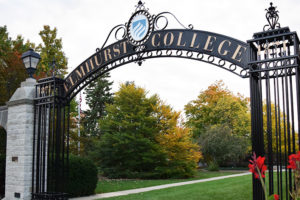
Americans are increasingly polarized when it comes to politics and religious observance, yet are surprisingly tolerant of religious diversity, Harvard political scientist Robert Putnam said in a February 9 lecture.
Americans who go to church today are more educated and have higher incomes than those who don’t, said Putnam, the Malkin Professor of Public Policy at Harvard University’s Kennedy School of Government. They get involved in Little League, blood drives and local service projects. They are more likely to vote and are more likely to be aligned on the political right.
Putnam’s talk before an audience of 600 in Hammerschmidt Memorial Chapel was part of the College’s yearlong Democracy Forum series. Early in the lecture, Putnam conducted a quick but revealing pop quiz. “How many of you regularly say grace?” he asked. A show of hands reflected national averages in which 44 percent say grace on a regular basis, 46 percent never do and the remainder do so only occasionally.
“When you raised your hand you told me a lot about yourself, your views on abortion and how you will vote,” Putnam said. Those who say grace are likely to go to church, be conservative and vote Republican.
The U.S. is unique for being devoutly religious and highly diverse in its religions yet accepting of others, Putnam said, noting that differences have torn apart Northern Ireland, Lebanon and Bosnia.
“We are a remarkably tolerant people even though we’re very polarized,” Putnam said, and the major reason is the relationships that Americans have in their private lives. Nearly half of marriages are now interfaith, 40 percent of Americans worship a different faith from their parents or their children, and half of all friendships are interfaith. “We see in our data people getting new friends of another faith, and they then become more tolerant of all faiths,” he said.
Putnam is the co-author of American Grace: How Religion Divides and Unites Us, an award-winning study of religious life and civic engagement. The book drew significantly from the Faith Matters Surveys conducted in 2006 and 2007 that measured Americans’ views on religion as well as social and political engagement.
The surveys found that although Americans are tolerant, three religious groups in the U.S. stand out for being viewed more skeptically than others: Muslims, Mormons and Buddhists.
The explanation is simple, Putnam said. Most Americans don’t know anyone of those faiths. Once they get to know someone of a different faith, they are more tolerant not only of that religion but all religions, he said.
Nice people
That tolerance was borne out in the surveys conducted for Putnam’s book. Eighty-two percent of even the most religious believe that non-religious people can be good Americans. Only 12 percent of Americans say there is only one true religion–their own. And 80 percent believe all religions have some basic truths. Despite theology that insists there is but one path to Heaven, 54 percent of evangelical Protestants believe non-Christians can go to Heaven.
Regular church-goers are more civically engaged because of the friends they make at church, Putnam said. They tend to forge stronger bonds with people at church, and those relationships encourage them to be more involved in the community.
“Church friends are supercharged, and each new church friend makes you a nicer person,” he said.
The surveys found that 35 percent of Americans say they attend church regularly, down sharply from a peak of 60 percent in the late 1950s. However, that is slightly higher than in Iran and significantly higher than European nations such as Italy, Germany and France.
For decades, surveys showed that 5 to 7 percent of Americans said they were not part of any organized religion, what Putnam called the “nones.” But in 1990, the “nones” began to increase, and by 2011 this group had grown to 19 percent. More significantly, Putnam said, 35 percent of Americans under age 30 now identify themselves as “nones,” and he predicted that will result in a major decline in religious participation in the future.
Earlier in the day, Putnam met with Elmhurst political science students and discussed the economic polarization of America, saying, “There is a huge and growing class difference among young people.”
Those from white, upper middle-class families are more active in school, sports and extracurricular activities, do more volunteer work, spend more time with their parents and go to church more often. For white kids from families in the bottom 25 percent income level, the opposite is true. Participation in all those areas is rapidly declining, and Putnam said that is widening the divide between the haves and have-nots.
“All those things predict life success. It means that kids from well-off backgrounds are dressed for success,” he said. Sadly, he added, only half-joking: “It is increasingly true that how successful you are depends on how well you chose your parents.”